Beyond the Hype: 6 Ways AI is Transforming Healthcare Providers
Beyond the Buzz: 6 AI Tools That Are Quietly Reshaping Healthcare Delivery

AI has made once unimaginable advances possible in healthcare, like machines detecting diseases faster, predicting chronic diseases before symptoms, and personalising treatment. By 2027, 30% of healthcare providers will implement AI for clinical decision support, contributing to a market projected to reach $110.61 billion by 2030.
The futuristic hype aside, since AI is no longer an experimental part of healthcare workflows, the real value of AI in healthcare lies in its practical applications.
AI adoption in healthcare is rising, with 43% of physicians and medical officers already using it for in-house patient monitoring and 40% reporting improved efficiency. Many AI-powered tools promise to help medical professionals personalise care and reduce manual labour while focusing more on quality care.
AI is no competitor to healthcare providers; it continues to complement human expertise and judgement in healthcare. The following article will look into some AI-powered tools that can positively transform healthcare without relying on the hype.
Top 6 Practical AI Solutions Transforming the Healthcare Industry
From diagnostics to workflow optimisation, AI has streamlined almost every aspect of healthcare. Here are the top 6 solutions that are currently influencing the industry:
1. Twofold Helps Eliminate Paperwork and Save Time
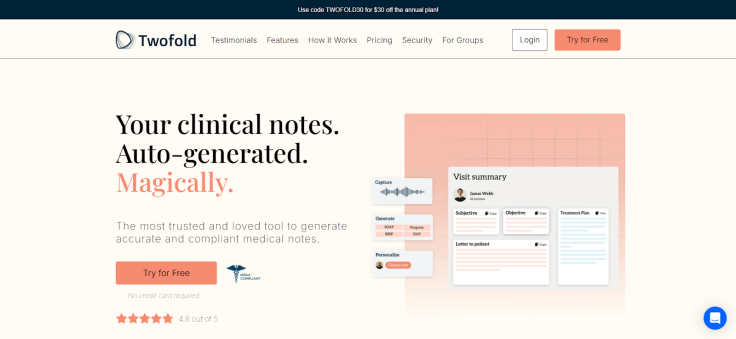
Twofold is an AI-powered medical scribing solution that helps clinicians automate clinical documentation. This tool can listen to conversations between patients and clinicians for up to 1.5 hours and create personalised notes in seconds.
Clinicians can create auto-generated patient instructions, review notes, and send them to any EHR. They can also use it to provide a quick recap of the patient session to auto-generate notes if they don't prefer voice capturing.
Twofold assists clinicians in focusing more on patient face time and quality care instead of tedious paperwork. The tool is HIPAA and HITECH-compliant, and it does not use users' data (audio conversations or text notes) to train its AI models or store any audio data.
The audio and notes fed to the tool are processed in real-time and deleted as soon as they are generated. The tool claims to rely on secure data centres and cloud hosting, such as Microsoft Azure, to ensure the best privacy and security practices.
2. Consensus Allows Easy Searching of Scientific Papers
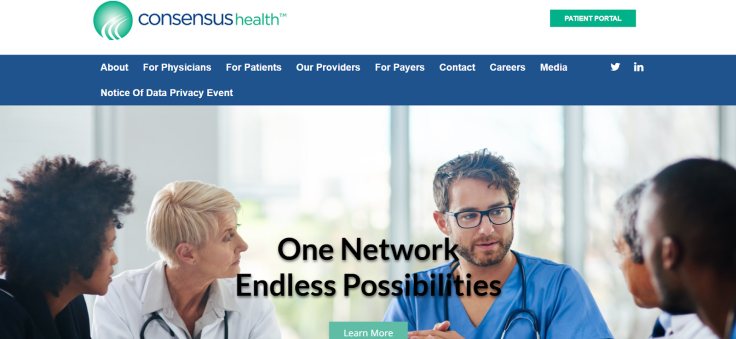
Consensus is an AI-powered search engine that enables searching for valid, cited medical papers from 200M+ scientific resources. Medical researchers and physicians often look for documents and key information within sites like Google Scholar and PubMed.
While these resource-filled search engines are rich in cited information and provide access to peer-reviewed articles, filtering and navigating relevant information through extensive results takes considerable time.
Researchers and physicians can use Consensus to find instant evidence-based answers to medical-related queries collected from scientific papers. It's great for extracting important information related to their research workflow. It makes researching and summarising documents easier and faster while ensuring the user gets results from valid sites.
The Study Snapshot allows users to see key information, such as the study design, the research population, sample size, etc. What's great about consensus is that it has quality indicators (QIs) that help find high-quality papers.
3. Twill Health Improves Care Coordination
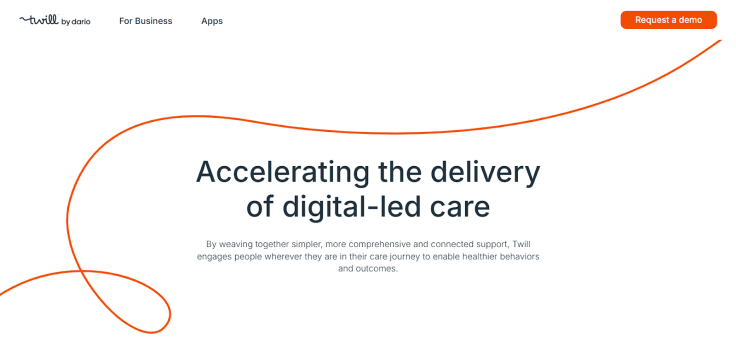
Twill Health is an AI-driven platform designed to serve and work with employers, health plans, healthcare providers, and pharmaceutical companies to deliver digital-led physical and behavioural healthcare and improve care coordination.
Although digital health tools are more advanced than ever, patient adoption lags far behind. In the US, only 8% of patients interested in healthcare have had the opportunity to use the Patient Support Program, and only 3% of them have downloaded a digital therapy solution. It indicates that most patients, especially the underserved, are digitally disconnected.
To address the issue, 10 of 20 global pharma companies have incorporated Twill solutions like 'Intelligent Healing Platform' to create personalised care journeys. This digital therapeutic platform also delivers culturally conscious content to engage patients of diverse cultural backgrounds while helping companies enhance the care journey.
On the contrary, health plan companies use Twill to improve individual well-being and behaviours while reducing costs. To support that, Twill offers massive resources and content with over 5,000 evidence-based activities to engage and guide members.
4. Viz.ai Automatically Detects Diseases Faster
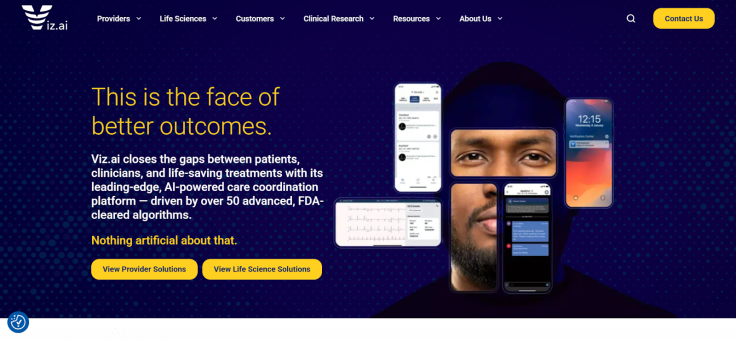
Viz.ai is an AI-based disease detection solution enriched with 50+ FDA-cleared algorithms. This tool's core purpose is not to replace human-supervised treatment but to offer clinicians and medical teams the ability to detect diseases from CT scans, EKGs, echocardiograms, and more.
Viz is a care coordination platform useful for faster detection of life-threatening diseases like strokes from CT scans. Its advanced AI algorithm analyses medical imaging data to deliver real-time insights and automated assessments regarding cardiovascular, neurovascular, vascular, and other trauma care.
Viz provides fast alerts and real-time communication features for medical teams to optimise treatment time and improve patient outcomes. With Viz, clinicians and medical staff can achieve up to 42% faster door-to-intervention.
5. TytoCare Allows Physical Diagnosis in Remote Healthcare
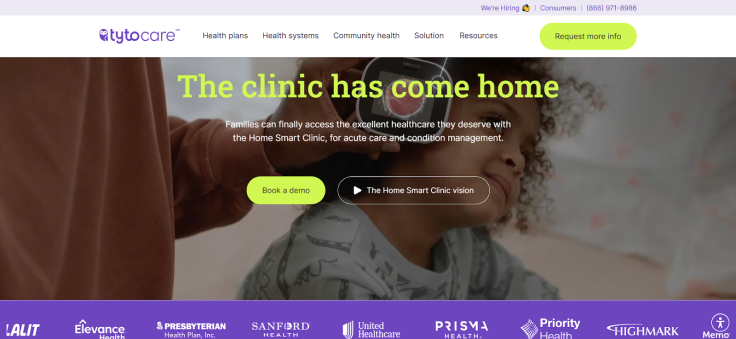
TytoCare is another AI-enabled, data-driven remote examination device that helps clinicians deliver remote healthcare with virtual physical exams. This device can diagnose both acute and chronic conditions.
The traditional audio and video telehealth solutions cannot meet the clinical needs of healthcare delivery. However, TytoCare bridges this gap by diagnosing patients from afar.
TytoCare is a portable, handheld medical device with a small LED screen, digital thermometer, camera, and lights. It can diagnose various ear, heart, lungs, skin, and other conditions. This platform supports live video calls and recorded sessions for maximum access and flexibility.
This device made virtual care truly effective, with 98% of visits resolved remotely. It also saved appointment hassles, offering streamlined patient care. It also helps create more satisfied patients with an NPS score of 83 while reducing care costs by up to 8.5%.
6. Navina Transforms Complex Data Into Actionable Insights
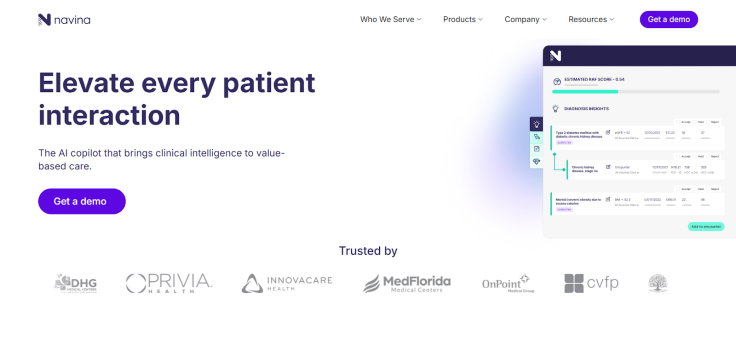
Navina is an AI-backed platform that converts complex and fragmented patient data into actionable insights. It provides conversational responses to medical questions, helping them create Patient Portraits in minutes.
Navina uses Explainable AI with 600+ algorithms to deliver reliable insights based on clinical evidence. Its concise clinical summaries allow clinicians and care teams to review patient records in less than 2 minutes.
Navina also assists in tracking risk adjustment and performance quality to encourage clinical teams to emphasise value-based care. This helps healthcare professionals improve RAF score accuracy and ensure comprehensive patient health assessments.
The Bottom Line
The AI revolution in healthcare makes it more preventive, predictive, and personalised. Clinicians and medical teams can now rely on AI solutions to accelerate their decision-making and time-to-treatment while improving preventive diagnosis. Practical AI solutions also give healthcare professionals more time to serve their patients and make quick decisions in times of urgency.
AI makes healthcare more accessible even in remote, underdeveloped areas, so patients don't have to wait in long queues or visit clinics to get the required care. Fast, accessible care is becoming a reality with the help of AI solutions.
© Copyright IBTimes 2025. All rights reserved.





















